Non-Lucrative Visa for Spain: The Complete UK Guide
Libbie Stevens | Spanish Visa Advisor | Wilmer Health | 1st February 2025 | hello@wilmerhealth.com
Contents
Spain is a dream destination for many people looking to retire, study, or enjoy a better quality of life. For non-EU citizens, including UK residents after Brexit, the non-lucrative visa offers a chance to experience Spain’s vibrant culture, warm weather, and laid-back lifestyle. However, the process of applying for this visa can seem complicated, with lots of paperwork, unfamiliar terms like “apostilles” and “sworn translations,” and other challenges.
In this guide, we’ll walk you through everything you need to know about getting a non-lucrative visa for Spain in the UK. From who can apply to what documents you’ll need and how to avoid common mistakes, we’ll give you all the tips and advice to make the process as smooth as possible.
What is a Spanish Non-Lucrative Visa?
A Spanish non-lucrative visa is a residency permit for non-EU citizens who wish to live in Spain without engaging in any work or professional activities. Often referred to as a “retirement visa,” it is best suited for individuals who have sufficient financial resources to support themselves throughout their stay.
One important restriction is that this visa does not allow you to work or conduct any business activities while residing in Spain.
Since Brexit, this visa has become particularly relevant for UK citizens, who now need a visa for long-term residence in Spain. It’s an excellent option for retirees and other individuals who meet the financial eligibility criteria.
Key Requirements and Documents
Applying for a Spanish Non-Lucrative Visa involves meeting several key requirements and preparing a range of essential documents. Some of these must be apostilled and officially translated, which can make the process feel overwhelming. To simplify things, we’ve broken down everything you need below:
Key Requirements and Documents
1. Financial Means
Applicants must demonstrate sufficient financial resources to support themselves during their stay in Spain without engaging in any work or professional activities. The financial thresholds are based on Spain’s Public Multiple Effects Income Indicator (IPREM), which is adjusted annually. As of 2025, the requirements are:
- Primary Applicant: A minimum annual income of €28,800.
- Dependents: An additional €7,200 per year is required for each dependent, such as a spouse or child. Applicants must provide proof of their relationship, such as a marriage or birth certificate.
Acceptable proof of financial means includes bank statements, pension plans, investment portfolios, or other verifiable income sources. Because the IPREM values are subject to change each year, it’s essential to confirm the latest figures before submitting your application. Proper documentation and up-to-date financial evidence will ensure your application meets the necessary standards.
2. ACRO Certificate
For UK applicants, a clean criminal record is a crucial requirement when applying for a non-lucrative visa for Spain. You’ll need to provide an ACRO Police Certificate for a Spanish Visa, which details your criminal history (or confirms the absence of any convictions) within the United Kingdom.
The ACRO certificate must meet the following criteria:
- It should cover the past five years of your residence in the UK.
- The document must be issued no more than three months before your visa application date to ensure it reflects up-to-date information.
- It must be translated into Spanish by a sworn translator.
- The certificate must also be legalised with an Apostille.
If you’d like to learn more about the ACRO Certificate, check out our in-depth guide on ACRO Certificates for Spanish visa applications.
3. Medical Certificate of Good Health
As part of your non-lucrative visa application, you must provide a Medical Certificate for a Spanish Visa from a licensed doctor confirming that you are free from any diseases that could pose a risk to public health.
For UK applicants, here are the key considerations:
- The certificate must be issued by a registered medical practitioner. Ensure the doctor is registered with the General Medical Council (GMC) and is authorised to provide such certificates.
- The doctor should also be registered with the Foreign, Commonwealth and Development Office (FCDO). This is an essential requirement and many visa applications have been delayed because applicants have used non-FCDO registered doctors.
- The certificate must explicitly state that you are not suffering from any infectious diseases, as outlined in the International Health Regulations of 2005, and is typically required to include wording such as: "This patient does not suffer from any diseases that could pose a threat to public health in accordance with the International Health Regulations of 2005."
- It must be issued no more than three months prior to the application date to ensure it is current.
- The certificate must be translated into Spanish by a sworn translator and legalised with an Apostille to meet Spanish consulate requirements.
If you want to learn more about the Spanish Visa Medical Certificate, explore our detailed guide on obtaining a Medical Certificate for Spanish visa applications in the UK.

Your Visa Medical Certificate of Good Health must be issued by a doctor registered with the Foreign, Commonwealth & Development Office (FCDO).
4. Spanish Health Insurance
One of the key requirements for a non-lucrative visa is obtaining private health insurance for a Spanish visa that offers full medical coverage while you reside in Spain. The policy must be purchased from a provider recognised in Spain and should comply with the country’s healthcare regulations. Importantly, the insurance plan must exclude co-payments and deductibles, ensuring that all medical expenses are fully covered. This requirement ensures applicants have access to comprehensive healthcare without burdening Spain’s public health system.
Your Spanish visa health insurance must remain valid for the entire duration of your visa and any renewals. To avoid delays or rejections, carefully review the policy terms and confirm that it meets the Spanish consulate’s requirements before submitting your application.
Our comprehensive guide for UK expats on obtaining health insurance for a Spanish visa provides in-depth information—perfect if you’re looking for more details.
5. Birth and Marriage Certificates
For applicants including family members in their non-lucrative visa application, certified marriage and birth certificates for a Spanish visa are essential documents. These certificates serve as official proof of relationship with the dependents included in your application and must meet the Spanish consulate’s legalisation and translation requirements.
For UK applicants, the following steps should be taken to ensure these documents are correctly prepared and accepted by the Spanish consulate:
- Obtain Certified Copies: Make sure you have the official copies of the birth or marriage certificates. For UK-issued certificates, certified copies can be requested from the General Register Office (GRO).
- Legalisation with an Apostille: Each certificate must be legalised with an Apostille stamp from the UK’s Foreign, Commonwealth & Development Office (FCDO). This confirms the document’s authenticity for use in Spain.
- Translation into Spanish: The certificates must be translated into Spanish by a sworn translator recognised by Spanish authorities. Ensure the translation includes all details from the original document accurately.
- Current and Valid Documents: Ensure the certificates are recent, most Spanish consulates in the UK prefer certificates issued within three months of the application date.
Our detailed guide on obtaining Marriage and Birth Certificates for a Spanish visa walks you through the process step by step — ideal if you need more information.
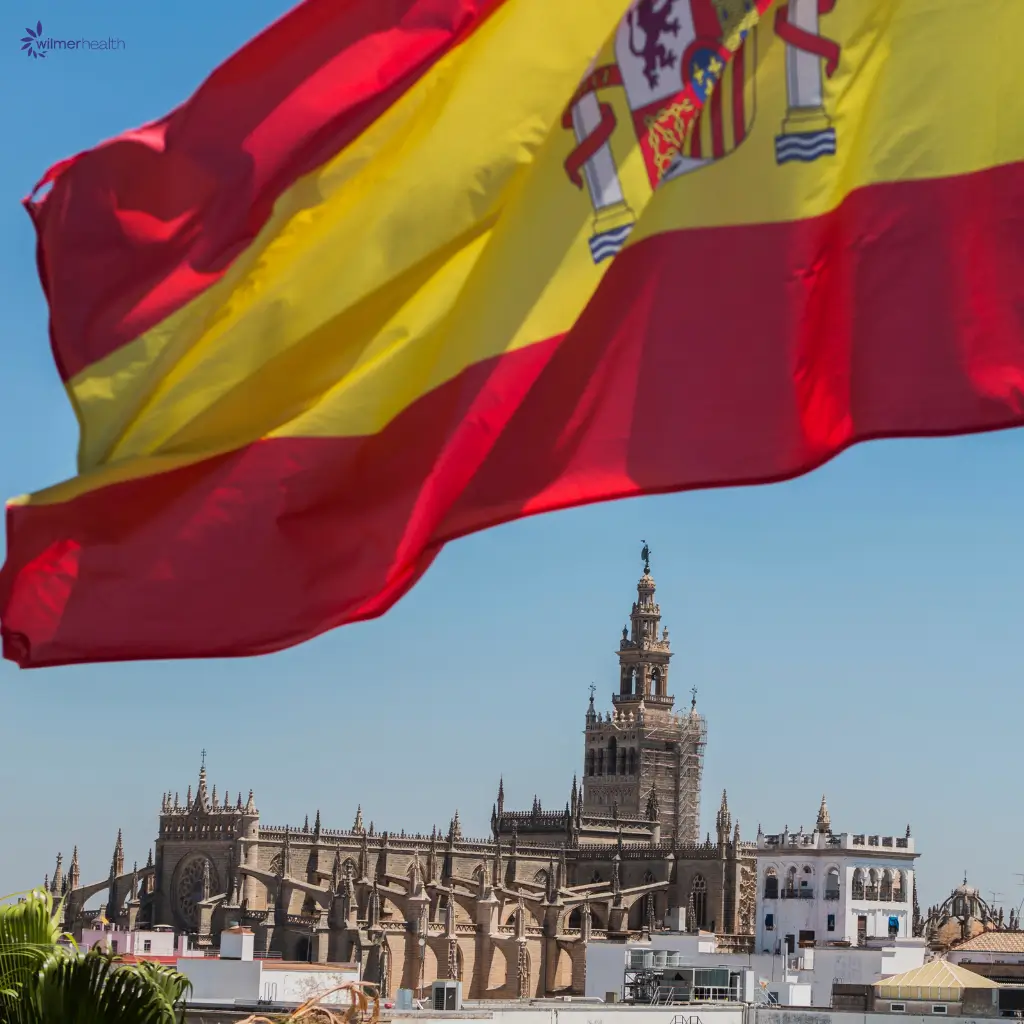
6. Proof of No Employment
Given that the Non-Lucrative Visa prohibits any work or professional activities in Spain, applicants of working age must provide evidence that they are not currently employed. This can be demonstrated through:
- Recent Employment: A P45 form or a letter from the former employer confirming the termination of employment.
- Self-Employed Individuals: A letter from an accountant or a statement from HMRC confirming the cessation of business activities.
- Early Retirees: A printout of the National Insurance record showing no recent contributions.
- Pensioners: An annual pension statement or an S1 form.
7. S1 Form
The S1 form is an important document for certain UK applicants applying for a non-lucrative visa, particularly retirees. It allows individuals to access healthcare in Spain as part of their application without needing to purchase private health insurance, provided they qualify under UK state healthcare arrangements.
Here’s what you need to know about the S1 form:
- The S1 form is available to UK retirees receiving a state pension, and certain individuals receiving long-term incapacity benefits.
- You can request an S1 form by contacting the NHS Overseas Healthcare Services. They will confirm your eligibility and send the form to you. Make sure to start this process early, as obtaining the S1 can take time.
- Once you have the S1, include it as part of your visa application. This demonstrates that your healthcare needs will be covered, reducing the financial burden on Spain’s public healthcare system.
- Upon arriving in Spain, you must register the S1 form with the Instituto Nacional de la Seguridad Social (INSS) to access public healthcare services. This step is crucial for activating your entitlement to healthcare.
For those eligible, the S1 form is an excellent alternative to private health insurance and can simplify your application process. Always verify with the consulate if the S1 is accepted as a substitute for private insurance in your case.
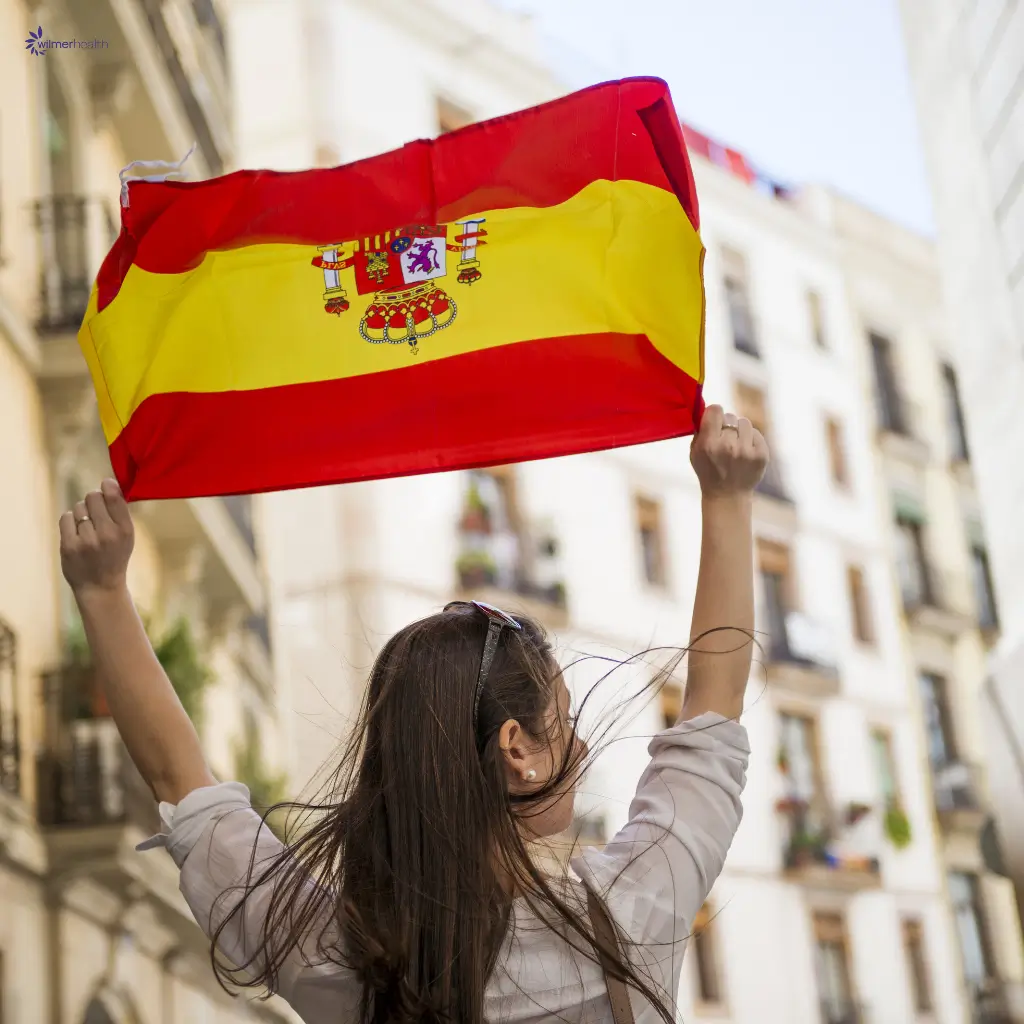
8. Valid Passport
You must have a valid passport with a minimum validity of one year from the intended date of entry into Spain. The passport should have at least two blank pages and must not be older than ten years.
9. Completed Application Forms
Two application forms need to be completed and signed:
10. Passport-Sized Photographs
Two recent passport-sized color photographs are required. The photos should be taken against a light background, with the applicant facing forward, and without any accessories that obscure the face.
11. Bank Statements
Spanish consulates in the UK (London, Manchester, and Edinburgh) typically require at least 6 months of bank statements to prove financial self-sufficiency for the Non-Lucrative Visa (NLV). However, some applicants have been asked for 12 months, so it’s best to check with your consulate or provide a full year’s worth to avoid delays.
Your statements must clearly show that you meet the minimum financial threshold of €28,800 per year (plus €7,200 per dependent), with funds held in your name and readily available.

12. Proof of Residence
Proof of residence in the UK is typically required when applying for a Spanish Non-Lucrative Visa. The Spanish consulate needs to confirm that you are applying through the correct consular office based on your UK address.
To prove your UK residency, you may be asked to provide one of the following:
- UK Driving Licence – A widely accepted document showing your address.
- Recent Bank Statement – Must include your full name and UK address.
- Utility Bill – A water, gas, electricity, or council tax bill in your name.
While this requirement may not always be listed on official consulate checklists, many applicants are asked for proof of residence at their visa appointment. To avoid delays, it’s best to include a driving licence, bank statement, or utility bill with your application. If unsure, check with your consulate before submitting your documents.
Many Spanish visa documents require an apostille stamp and a sworn translation, which can be confusing. If you’re unsure what these are, check out our Guide to Apostilles & Sworn Translations for Spanish Visa Documents in the UK for a clear explanation.
Spanish Consulate in the UK
Once you’ve arranged all the necessary documents for your non-lucrative visa application, it’s time to move forward with submitting your application. The Spanish consulate you must visit depends on your place of residence in the UK. There are three main consulates:
- London: Covers England (except areas covered by Manchester), Wales, and Northern Ireland.
- Manchester: Serves the Midlands, Northwest England, and North Wales.
- Edinburgh: Covers Scotland and the Northeast of England.
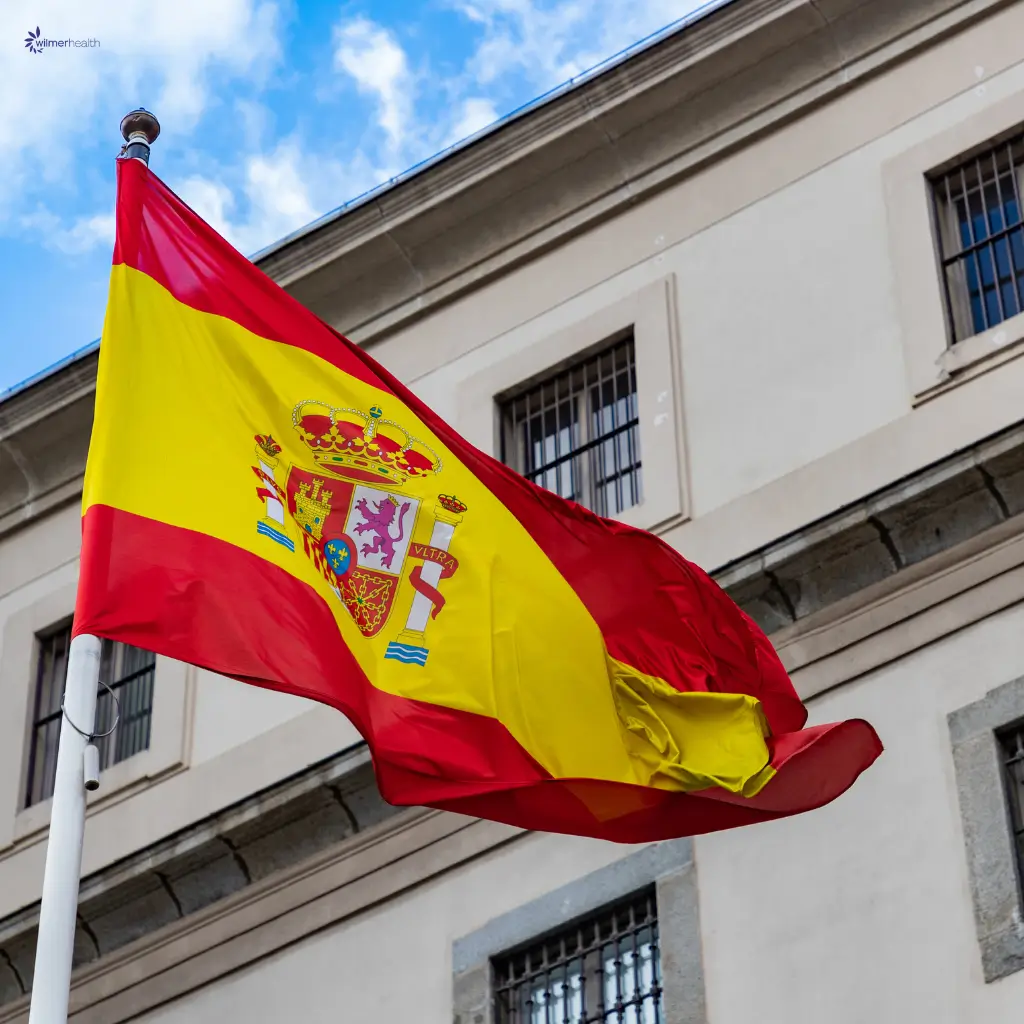
1. Book an Appointment
Submitting your non-lucrative visa application involves attending an in-person appointment at the Spanish consulate. Appointments must be booked online through the official booking system available on the consulate’s website. It’s essential to secure your slot as early as possible, as these appointments are in high demand and can fill up quickly.
2. Prepare for the Appointment
Proper preparation is key to ensuring your non-lucrative visa appointment goes smoothly. Before your scheduled visit, make sure all your documents are ready and well-organised. You’ll need to bring both the originals and photocopies of each required document. Arranging everything neatly in a folder will make it easier to access during your appointment.
3. Attending the Appointment
At the consulate, the staff will review your documents, and take your visa application fee.
4. Pay the Visa Fee
The visa application fee must be paid at the consulate during your appointment. The fee varies slightly depending on the consulate but is typically around £500, plus a processing fee of £10.
5. Application Processing Time
After submitting your application, processing times vary but typically take 1 to 3 months. During this period, the consulate may contact you for additional information or to correct any errors in your application.
What Happens After Your Visa is Approved?
Congratulations — once your non-lucrative visa is approved, you’re ready to begin your new life in Spain! However, there are several important steps to take upon receiving your visa to formalise your residency and ensure compliance with Spanish regulations.
Validity of Your Visa
The non-lucrative visa is initially issued as a 90-day visa, allowing you to enter Spain and begin the residency process. You must relocate to Spain within this three-month period, as the visa expires if not used within this time frame.

Apply for Your TIE
Once you arrive in Spain, your next important step is to apply for the Tarjeta de Identidad de Extranjero (TIE) — your official residency card. This document confirms your legal status in Spain and is essential for everyday tasks such as opening a bank account, signing rental agreements, and accessing healthcare.
You must apply for your TIE within 30 days of entering Spain on your visa. Failing to meet this deadline may result in complications with your residency status.
Here’s how to apply for your TIE:
Step 1: Book an Appointment
You must schedule an appointment at your local immigration office (Oficina de Extranjería) or police station that handles foreign resident applications. This can be done online through the official Spanish government website. Due to high demand in some areas, it’s advisable to book your slot as early as possible.
Step 2: Prepare Your Documents
Before attending your appointment, ensure you have the following:
- Passport (original + photocopy) with your visa.
- Completed EX-17 form (TIE application form).
- Proof of address in Spain, such as a rental contract or empadronamiento (local registration).
- Proof of payment for the TIE application fee (Form 790-012).
- Two recent passport-sized photographs meeting Spanish ID requirements.
Step 3: Attend Your Appointment
During the appointment, your fingerprints and biometric data will be taken, and your documents will be reviewed. Once everything is verified, you’ll receive a receipt confirming that your TIE is being processed.
The TIE is initially valid for 12 months, after which you must renew it before it expires.
Applying for your TIE is a straightforward but essential step in establishing your residency in Spain. Make sure to complete the process within 30 days of arrival to avoid any legal complications.
Renewing Your Non-Lucrative Visa
Renewing your non-lucrative visa is an essential part of maintaining your residency in Spain. The renewal process is straightforward but requires careful preparation and timely action to ensure your residency remains valid. Here’s what you need to know:
First Renewal (After 1 Year)
Your initial non-lucrative visa is valid for 12 months. Before it expires, you must apply for a renewal to extend your stay. The first renewal grants you a 2-year residency permit, provided you continue to meet the requirements.
- Begin the renewal process 60 days before your visa expires or within 90 days after its expiration.
- Submit your application through the local immigration office in Spain.
- Provide proof of continued financial means (e.g., bank statements, pension documents), valid health insurance and a proof of address in Spain.
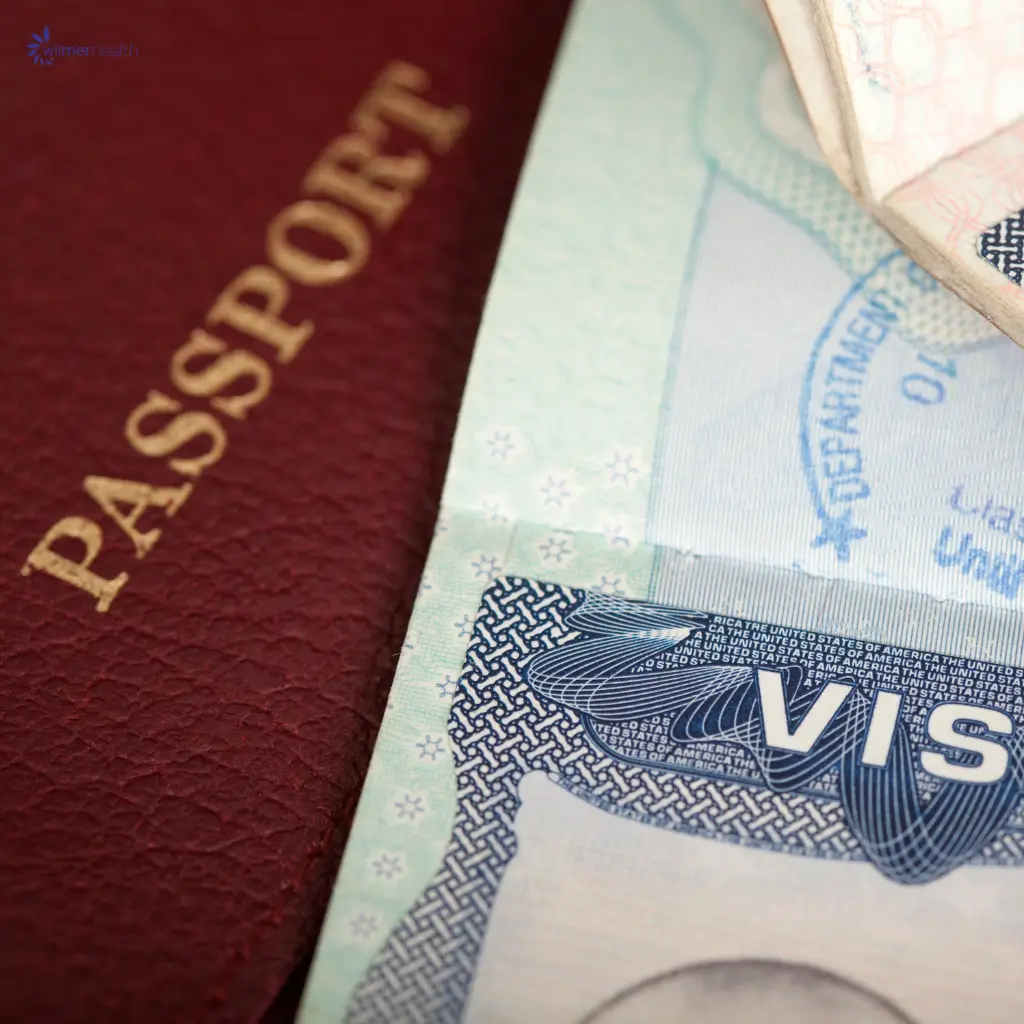
Second Renewal (After 3 Years)
At the end of your first renewal (year three), you’ll need to apply for a second renewal. This will extend your residency for another 2 years. The process and requirements are similar to the first renewal, and you must continue to meet the financial and health insurance criteria.
Permanent Residency (After 5 Years)
Once you’ve legally resided in Spain for 5 consecutive years, you become eligible to apply for permanent residency. A permanent residency permit is valid for 10 years and comes with the added benefit of fewer renewal requirements. While you still won’t be allowed to work on a non-lucrative visa, permanent residency offers greater stability for long-term residents.
Common Challenges and How to Overcome Them
Applying for a non-lucrative visa for Spain can be a complex process, and many applicants encounter common challenges along the way. Understanding these potential obstacles and how to address them can save time and frustration while improving the likelihood of a successful application.
1. Medical Certificate of Good Health
- Challenge: Many applicants struggle to get an appointment with a doctor who is authorised to issue the required medical certificate. Additionally, not all General Practitioners (GPs) in the UK are registered with the Foreign, Commonwealth & Development Office (FCDO), which is essential for their signatures to be recognised by Spanish authorities.
- Solution: Use a private service or clinic where the doctors are registered with the FCDO. These services are often familiar with the specific requirements for Spanish visa applications, ensuring the certificate meets all necessary standards.
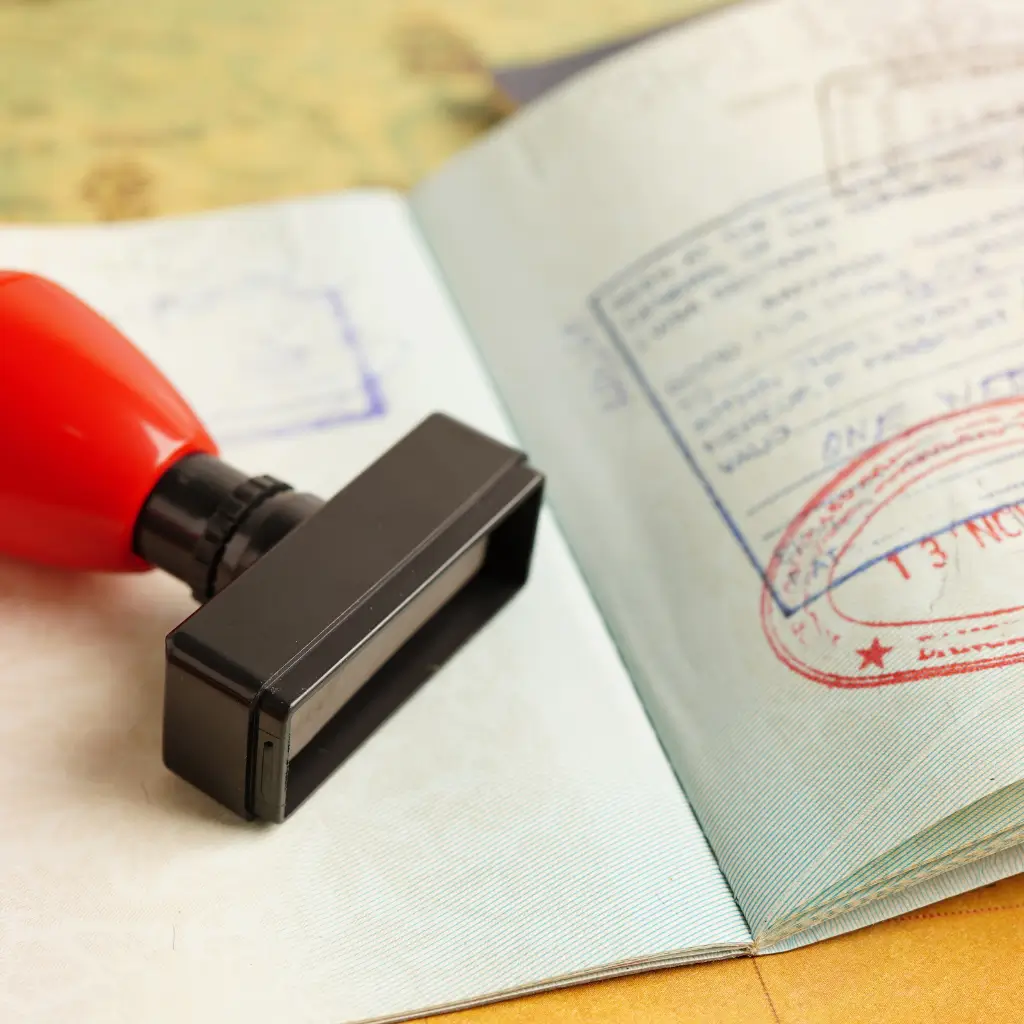
2. Sworn Translation
- Challenge: Some applicants attempt to handle translations themselves or use non-accredited translators. This often results in delays, as the Spanish government requires documents to be translated by sworn translators officially recognised by Spanish authorities.
- Solution: Always use a certified sworn translator for any required translations, such as police certificates, medical certificates, or birth/marriage certificates. This ensures compliance with Spanish legal requirements and avoids unnecessary delays.
3. Using Tracked Postal Services
- Challenge: Important documents frequently get lost in the post, causing stress and delays for applicants who need to submit original or certified copies.
- Solution: Always use a tracked and signed-for postal service when sending documents, whether within the UK or to the consulate. Services such as Royal Mail Special Delivery or reputable courier companies offer added security and peace of mind.
4. Police Record Issues
- Challenge: The ACRO Police Certificate can present challenges, including delays in processing, errors in the certificate, or complications arising from previous convictions.
- Solution: Apply for your ACRO Police Certificate well in advance to allow time for processing. Carefully review the document for accuracy before submission. If you have a prior conviction, consult a legal expert or visa adviser to determine how it might impact your application and what steps to take to mitigate any issues.
By addressing these challenges proactively, you can minimise delays and reduce the likelihood of problems with your application. Proper planning and working with experienced professionals — such as sworn translators or FCDO-registered doctors — can make the process much smoother.
Is There a Chance My Visa Application Could Be Rejected?
While the majority of non-lucrative visa applications are approved, rejections can occur if certain requirements are not met. Understanding the common reasons for rejection and how to handle them can help you navigate this process with confidence.
Common Reasons for Rejection
- Incorrect or Missing Documents: Incomplete applications, missing required documents, or errors in submitted paperwork are the most frequent causes of rejection. This includes failing to legalise or translate documents as required by Spanish authorities.
- Insufficient Financial Proof: If the consulate determines that your submitted financial evidence does not meet the required thresholds, this can result in a denial.
- Issues with the Police Certificate: Errors, omissions, or previous convictions on the ACRO Police Certificate may lead to complications with your application.
- Health Insurance Not Meeting Requirements:: If your health insurance policy lacks the necessary coverage, includes co-payments, or is not issued by a provider recognised in Spain, your application may be rejected.

What Happens If Your Application Is Rejected?
If your application is denied, the consulate will provide a written explanation outlining the reasons for the rejection. This clarity allows you to address the specific issues and take corrective action.
In most cases, you have 30 days to appeal the decision. During this period, you can gather any missing documents, rectify errors, or submit additional evidence as needed. Appeals should be submitted directly to the consulate or as instructed in the rejection letter.
Although rejection is rare when applications are properly prepared, it’s essential to remain diligent and thorough throughout the process. If you encounter any issues, appealing promptly and addressing the consulate’s concerns can often lead to a successful outcome.
How Wilmer Health Can Help You with Your Spanish Visa Application
Applying for a Spanish non-lucrative visa can feel overwhelming, with multiple documents to gather, translations to arrange, and legalisations to complete. At Wilmer Health, we take the stress out of the process by offering a convenient, all-in-one visa support service that ensures your documents meet Spanish consulate requirements — quickly and efficiently.
Instead of navigating multiple services, let us handle everything for you. Here’s how we can help:
Visa Medical Certificate – Fully Prepared & Ready to Submit
Getting a visa medical certificate in the UK can be frustrating, especially when trying to find a doctor who is FCDO-registered. With Wilmer Health, you can rest easy. We provide:
- A medical certificate of good health issued by a GMC-registered and FCDO-approved doctor.
- A fully translated version of your certificate, ready for submission.
- Apostille legalisation to meet official Spanish requirements.
- Fast and hassle-free delivery straight to your door.
No need to chase after doctors, translators, or legalisation offices — we take care of it all.
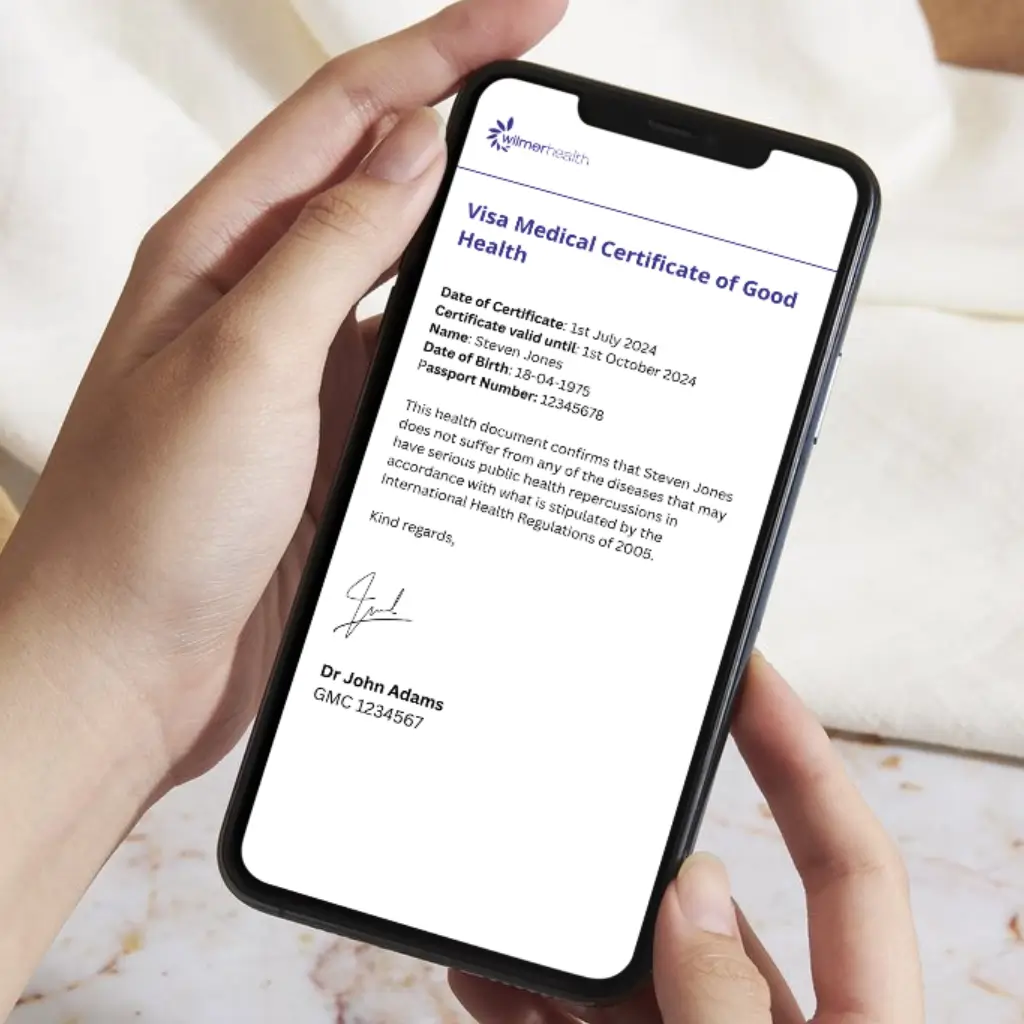
ACRO Police Certificate – Fully Legalised & Translated
Obtaining an ACRO Police Certificate is another important step in your visa application. However, it also requires an Apostille legalisation and a sworn translation into Spanish before it’s accepted by the consulate.
With Wilmer Health, we handle the entire process for you:
- We apply for your ACRO certificate on your behalf.
- We arrange for Apostille legalisation through the FCDO.
- We provide a sworn Spanish translation, ensuring full compliance.
- The completed documents are delivered directly to your UK address.
This saves you time and effort while ensuring your documents meet all legal requirements.

Birth & Marriage Certificates – Obtained, Legalised & Translated
If you are including a spouse or dependent children in your application, you’ll need up-to-date birth and marriage certificates that have been apostilled and translated. Instead of dealing with government offices and complex paperwork, let us take care of it for you:
- We obtain updated copies of your birth or marriage certificate.
- We arrange for Apostille legalisation.
- We provide a sworn Spanish translation for submission.
- We deliver the completed documents to your home in the UK.
This ensures your dependent-related paperwork is correct, avoiding delays or rejections.
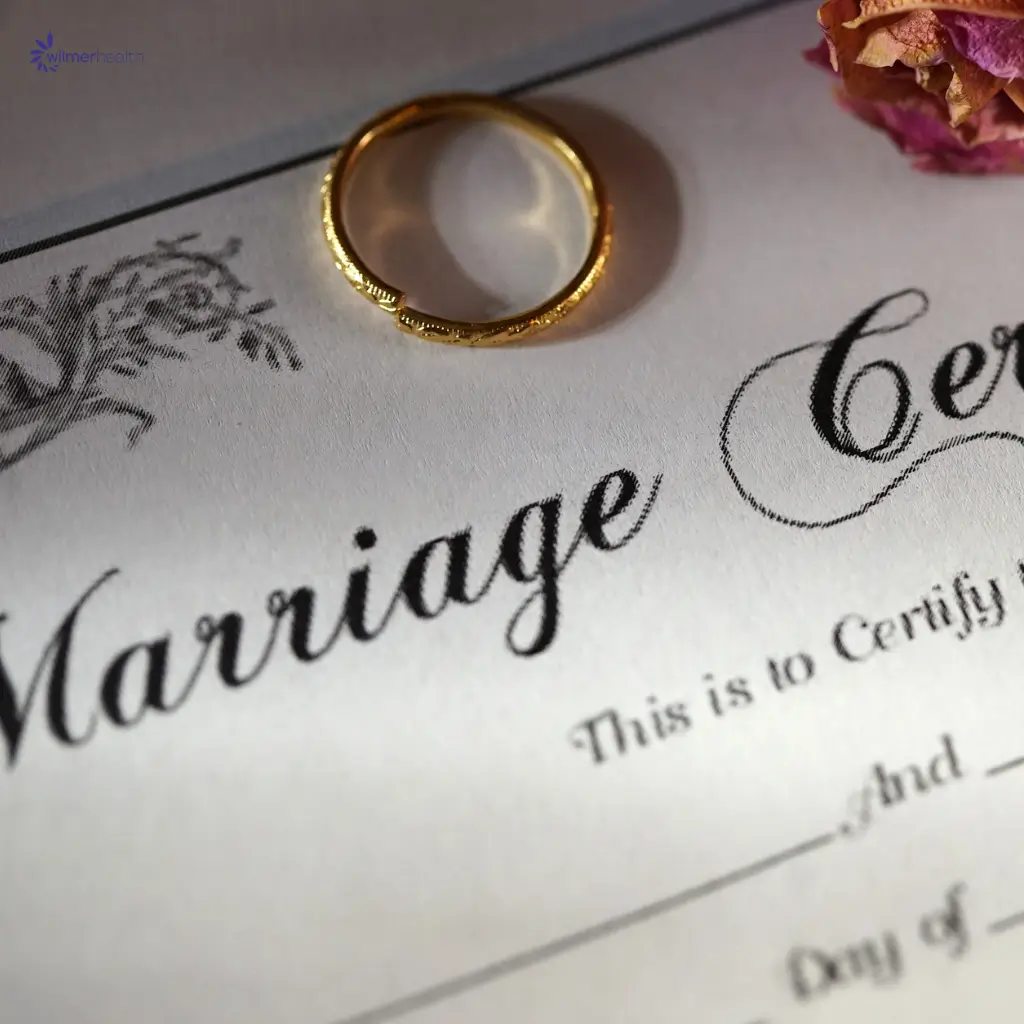
Discounted Private Health Insurance – Fully Compliant with Spanish Visa Rules
One of the key requirements for a non-lucrative visa is private health insurance that meets strict Spanish government standards — no co-payments or deductibles, full coverage, and recognition in Spain.
Through our exclusive partnership with ASSSA Health Insurance, we can help you:
- Access discounted rates exclusively for Wilmer Health customers.
- Get a policy that meets all Spanish visa requirements.
- Find the best coverage options suited to your needs.

Wrapping Up
Applying for a Non-Lucrative Visa for Spain may seem complex, but with the right preparation, it can be a smooth and straightforward process. By ensuring that you have all the required documents — properly translated and legalised — you can avoid delays and increase the chances of a successful application.
Whether you’re planning to retire, study, or enjoy an extended stay in Spain, the non-lucrative visa provides the perfect opportunity to experience the country’s culture, lifestyle, and sunny climate. If you need assistance with obtaining and preparing your essential documents, we’re here to help with Spanish visa medical certificates, ACRO police checks, birth and marriage certificates, apostille legalisation, and Spanish private health insurance for visa purposes.
Spain is waiting — start your journey today with confidence!